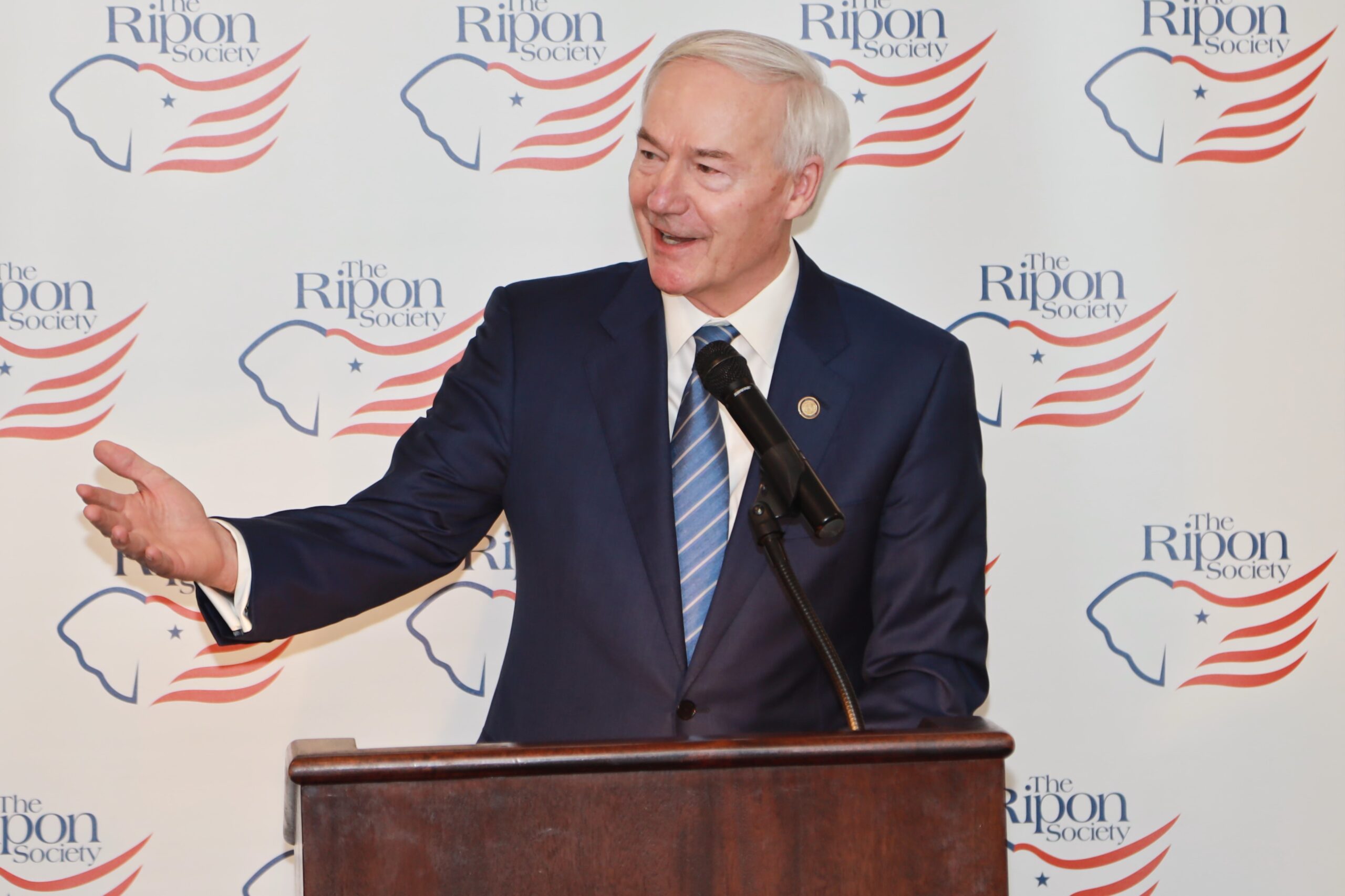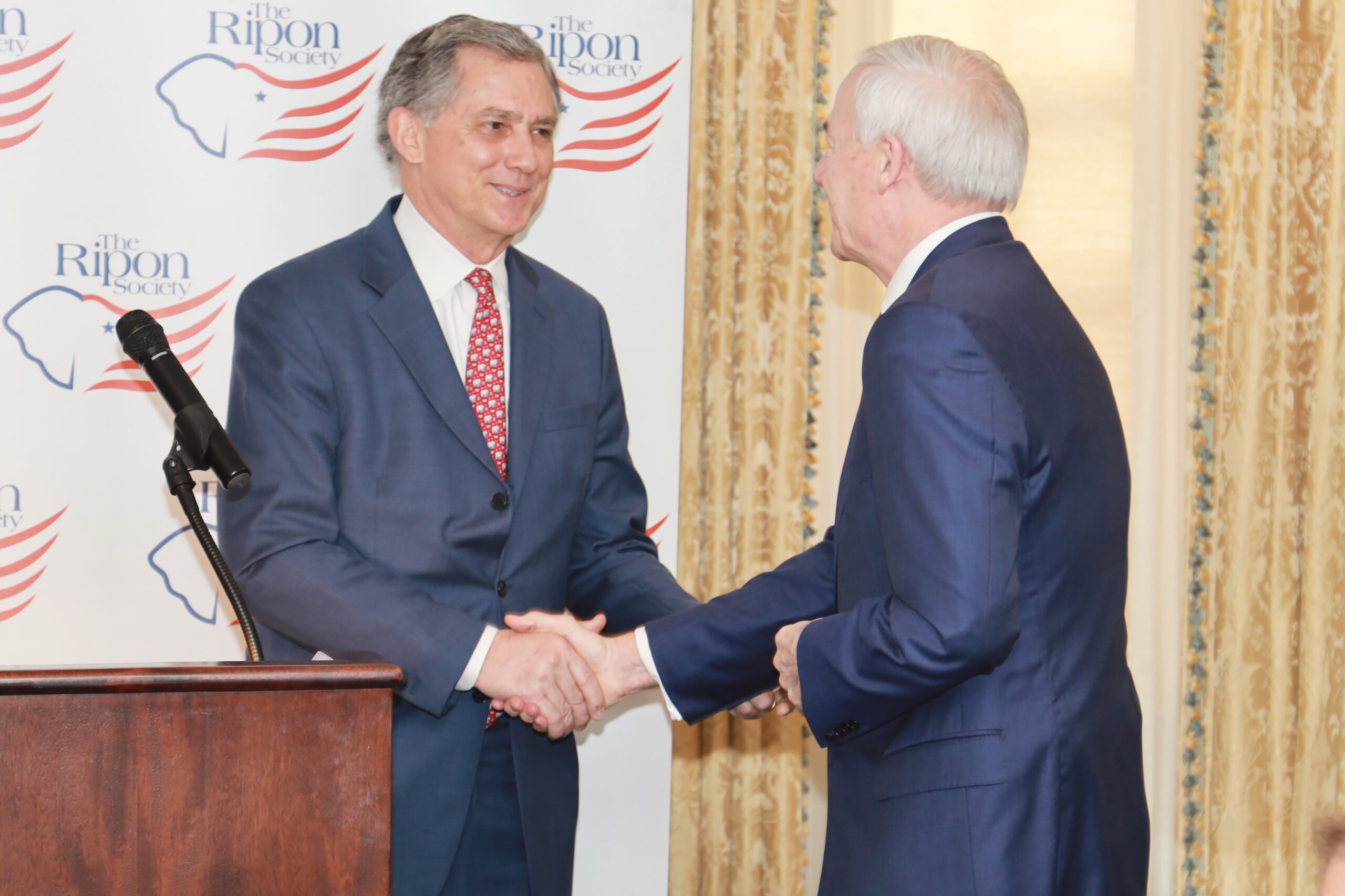
Asa Hutchinson Talks About his Solutions-Oriented Approach to Governing his Home State
WASHINGTON, DC – Arkansas Governor Asa Hutchinson appeared before a luncheon meeting of The Ripon Society this past Wednesday afternoon, delivering remarks about his role as Chairman of the National Governors Association, and his bipartisan, solutions-oriented approach to governing his home state.
“We had the NGA meeting less than 10 days ago,” Hutchinson stated, referring to the annual gathering of Governors that was recently held in Washington. “It’s sort of the last bastion of potential bipartisanship. It’s neat to see the Governors talking about problems that we have in common and how we can address them together. And we share ideas, whether Democrat or Republican.”
One of those ideas related to computer science education, which, Hutchinson said, he has not only made a national initiative in his role as NGA Chairman, but a priority in his role as Chief Executive of the Razorback State.
“Arkansas was the first state to mandate that all schools offer computer science,” he stated. “We went from 1,100 students taking computer science when I became Governor, to over 12,500 taking computer science today. And we took it a step further in this last legislative session. We were the third state to mandate it as a graduation credit. To graduate now from Arkansas schools, you have to have computer science.
“This is an extraordinary step forward, recognizing that teaching our young people the opportunities in software development and cyber security allows us to bring technology companies to Arkansas. It allows us to feed the incredible entrepreneurial spirit in technology that we already have — from Walmart, which is a technology company, to U.S. Steel, which is a technology company that happens to make steel. We have to produce that talent, and we’re doing that. And I took that issue nationally, asking governors to form a compact to help promote that in all the different states.”
Hutchinson is serving his second term as the 46th Governor of Arkansas, having been reelected in 2018 with 65% of the vote, receiving more votes than any other candidate for governor in the state’s history. He became Chairman of the National Governors Association last July, and leads the organization with Democratic Governor Phil Murphy of New Jersey serving as his Vice Chair.
Hutchinson noted that he and Murphy took part in a panel discussion at the recent meeting of all the Governors, a discussion that was moderated by philanthropist David Rubinstein and focused in part on the meaning of bipartisanship and why it is important for Republicans and Democrats to work together to get things done.
“David Rubenstein is really a great interviewer,” Hutchinson recounted. “The first question he asked me was, ‘Well, Governor Hutchinson, what’s so bad about partisanship?’ Great way to start out the conversation on bipartisanship — to ask me about partisanship. And it is a great question.
“I look back at my own history, and I was as partisan as anyone. I was Chairman of the Republican Party of Arkansas when we were in the minority, and I helped build the Republican Party to where it’s a red state today. So, I’m partisan in elections. But I also believe that once the election is over, you’ve got to solve problems. And to solve problems, you’ve got to reach across the aisle. And that to me is a pattern that leadership needs to follow today.”
Hutchinson then proceeded to cite a number of areas where he thought America’s leaders needed to work together and focus on policy, not politics.
“We’ve got to have improved border security,” he stated. “We got to address the issue of inflation. When you look at trade policy, I came up in the era of Ronald Reagan when the hallmark principle of the Republican Party was to open markets, not close markets. I still happen to believe that is a good philosophy, but we’ve drifted away from that. When you look at the challenges in Europe, the challenges in China, we have these problems to address, and leadership makes a difference in how you approach those. And that’s where you set aside partisanship and you work together to get that done. Obviously, you don’t abandon principles — you stick with your principles. But you find common ground. And to me, thoughtful, conservative leadership is important today in America.”
Hutchinson also offered his thoughts on the recent decision by the Republican National Committee to censure Congresswoman Liz Cheney and Congressman Adam Kinzinger for their service on the Select Committee to Investigate the January 6th Attack on the United States Capitol.
“I’ve been a former party chairman, and that’s not the job of the party first of all,” he stated. “And secondly, we have to be about the future. We have to be about addressing these problems and not the past. And so I was one of the few governors that spoke out on that. I said that this was wrong. It is not about building a party, but it is looking at the past. I believe that genuinely. And I think it’s going to be more challenging for our party looking into the future to win in 2022.
“We have to be able to articulate our vision for the future. But we also have to be able to stand for the rule of law. And we have to make sure that we do not diminish that by the type of resolution that diminishes what happened on January 6th. We’re going to have to continue to address that as a party and as leaders.”
Hutchinson concluded his remarks by returning to his efforts as Governor of Arkansas and some of the key initiatives he has been able to accomplish in office over the past seven years.
“When I became Governor,” he noted, “we had a 7% individual income tax rate in Arkansas. We lowered that tax from 7% to 5.9%, and we’re going to be lowering it in the next two years to 4.9%.”
“For 100 years of Democrat leadership, they forecasted what the revenue was going to be for the next year and then they would spend every dime. When I became Governor, I said, ‘Why can’t we create savings?’ We started that practice, and we now have the equivalent of 20% of our state budget in a reserve account, now $1.2 billion.”
“Lowering taxes. Setting up that reserve account. Creating the surplus. Creating jobs in the state. Leading in computer science education. Managing the pandemic and keeping our economy going, while also respecting both the public health needs and individual freedom needs of our citizens. I think we’ve done a good job in Arkansas.”

Hutchinson was introduced at Wednesday’s discussion by his fellow Arkansan, Congressman French Hill, who represents the 2nd District of the Razorback State in the U.S. House. Following Hutchinson’s remarks, Hill asked the Governor to expand on his comments relating to the pandemic, and more specifically, his push from the start of the pandemic to keep things open.
“I recognized in the two-month period we went virtual that this cannot happen again,” Hutchinson recalled, looking back to that period in early 2020 when the country as a whole more or less shut down. “And so that spring I said, ‘Next year, we’re going to be open with in-classroom instruction, and it’s going to be statewide.’ And that message worked. Even through the fall, when we got hit hard again and there was pressure from the unions and others saying, ‘Close it down, close it down’ — we never did.
“We kept things open. And that was a good decision, because as Johns Hopkins and others are articulating now, the harsh difficulty in terms of the mental health of our students and athletes when you’re closed down — it’s hard to make that gap up. And so I’m glad we kept things open.”
To view Hutchinson’s remarks before The Ripon Society’s luncheon meeting on Wednesday, please click on the link below:
The Ripon Society is a public policy organization that was founded in 1962 and takes its name from the town where the Republican Party was born in 1854 – Ripon, Wisconsin. One of the main goals of The Ripon Society is to promote the ideas and principles that have made America great and contributed to the GOP’s success. These ideas include keeping our nation secure, keeping taxes low and having a federal government that is smaller, smarter and more accountable to the people.



